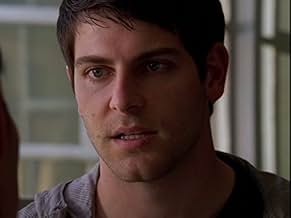Os casos de uma unidade do FBI especializada em investigações de pessoas desaparecidas.Os casos de uma unidade do FBI especializada em investigações de pessoas desaparecidas.Os casos de uma unidade do FBI especializada em investigações de pessoas desaparecidas.
- Ganhou 2 Primetime Emmys
- 21 vitórias e 47 indicações no total
Explorar episódios
Avaliações em destaque
9kols
After reading a half-dozen of the reviews convinced that a lot of folks who didn't like it were expecting a typical cop show. It isn't. May have been an experiment on Bruckheimer's part - turning cop show conventions on their head.
First there's the shows low-key tone: no screaming sirens, no melodramatic hooks, no heart-pounding chases or rescues. Chases and especially rescues do exist but, like all of the other expositional elements, they're portrayed in measured, deliberate and muted tones. Just like the "teams" response to each week's puzzle. All very quiet with just a hint of intensity and a clear demonstration that they care about their victims.
All elements that, except for the tone, Without a Trace shares with most cop shows. Just reversed.
Now here's the really radical departure - the show's focus is centered on what are usually the secondary characters: the victims and the lives surrounding them. In fact, most of the "team's" interactions are with the secondary characters.
Think about shows, very good shows, like Bones or Castle or Burn Notice or any one of dozens of cop shows: all centered on the "team" and it interactions. Victims, perps and puzzles exist mainly to highlight those interactions.
This is not a criticism. I love the shows mentioned.
My point is simply that Without a Trace reverses those conventions and does it very successfully. One one hand, enough time is spent on the team to humanize it; on the other, just enough emphasis on the victims and their stories to elevate them to the the primary focus.
Takes some getting used to but well worth the effort. Surprising, those few scenes dedicated to the "team", either as individuals or a whole, wind up describing a very rich set of personalities, though you might have to watch a lot of episodes to realize it.
Like all cop shows there there are problems with plot integrity and, with Without a Trace, the very premise: the FBI getting involved before the local cops and their 48-hour window. And like all cop shows, the inconsistencies and questionable plot lines are simply elements meant to invoke the suspension of disbelief. Nothing more.
If this was an experiment on Bruckheimer's part, seven seasons speak volumes to its success.
First there's the shows low-key tone: no screaming sirens, no melodramatic hooks, no heart-pounding chases or rescues. Chases and especially rescues do exist but, like all of the other expositional elements, they're portrayed in measured, deliberate and muted tones. Just like the "teams" response to each week's puzzle. All very quiet with just a hint of intensity and a clear demonstration that they care about their victims.
All elements that, except for the tone, Without a Trace shares with most cop shows. Just reversed.
Now here's the really radical departure - the show's focus is centered on what are usually the secondary characters: the victims and the lives surrounding them. In fact, most of the "team's" interactions are with the secondary characters.
Think about shows, very good shows, like Bones or Castle or Burn Notice or any one of dozens of cop shows: all centered on the "team" and it interactions. Victims, perps and puzzles exist mainly to highlight those interactions.
This is not a criticism. I love the shows mentioned.
My point is simply that Without a Trace reverses those conventions and does it very successfully. One one hand, enough time is spent on the team to humanize it; on the other, just enough emphasis on the victims and their stories to elevate them to the the primary focus.
Takes some getting used to but well worth the effort. Surprising, those few scenes dedicated to the "team", either as individuals or a whole, wind up describing a very rich set of personalities, though you might have to watch a lot of episodes to realize it.
Like all cop shows there there are problems with plot integrity and, with Without a Trace, the very premise: the FBI getting involved before the local cops and their 48-hour window. And like all cop shows, the inconsistencies and questionable plot lines are simply elements meant to invoke the suspension of disbelief. Nothing more.
If this was an experiment on Bruckheimer's part, seven seasons speak volumes to its success.
The early seasons were good! The story lines were well written mysteries. The romance between Poppy and Eric Close was a good idea. The romance between her and Anthony La Paglia was not!!
I find this show engaging enough to watch fairly regularly but have to disagree with all the glowing reviews that have been posted. The plot lines are often simplistic and sensationalist and the long music-driven "emotional" scenes are pandering and boring. The characters are one dimensional and any "development" seems forced. I feel like Lenny on Law & Order is my good buddy even though that show hardly has any character development, whereas the WAT characters seem more like bullet points--"the wise, good hearted leader with family problems", "the tough blonde going through an emotional crisis", etc. The show is okay but it's really a slick presentation of something that could use a few more IQ points.
I always enjoy a good mystery and this is definitely one of those.....They are not afraid to tackle social issues like Abortion and Middle Eastern politics and much more.....Definitely a great series and I wish it had lasted even longer...but it did have a long run..........
WAT is the show I look forward to watching most every week (comes in a close 2nd after The Closer). I don't know why so many people think the show has gone downhill. It still holds my interest for that hour. My only criticism (and it's not about Rosalyn Sanchez) is that they have one of the most talented actresses alive today, Marianne Jean-Baptiste, and they hardly use her! She deserves much more character development and depth to her role. It's the same story with S. Epatha Merkerson on Law & Order. Another underused great talent. However, perhaps after being recognized for Lackawanna Blues, NBC will wake up. Let's see more Marianne in the future. At least let her express an emotion every now and then. Even Tony LaPaglia is allowed to do that.
Você sabia?
- CuriosidadesDuring each episode, a 15-second presentation appears, asking the public for help in finding real-life missing persons. The FBI provides a picture and descriptive information about the missing person to be displayed with a voice-over message recorded by one of the series stars.
- Erros de gravaçãoSince the inception of the agency, FBI agents travel in pairs when interview subjects. This is both to have a witness to the interview as well as for protection in case unexpected things occur. Multiple times during the show, single agents are shown talking with subjects alone, even in their homes or places unfamiliar to the agents.
- Citações
Martin: I think he's sleeping with her. The way he talks about her and she's climbing that corporate ladder pretty quick.
Jack Malone: He may be in love with her, but he's not sleeping with her. Never even thought about it.
[Martin looks quizzically at Jack]
Jack Malone: He's gay.
Martin: What, because he called her a "fireball"?
Jack Malone: No... 'cause he was checking you out.
- Cenas durante ou pós-créditosAmongst the opening credits, for a brief moment the words "Amber Alert" are flashed on the screen. The Amber Alert system was formally inaugurated in the state of California, July 31, 2002. It drew both national and international recognition in its success in aiding authorities in their search for abducted children. In less than one year, the California Amber Alert system has been credited with aiding in the rescue of over a dozen children. The intial system was formulated in Texas in 1996, and is named after 9-year-old Amber Hagerman who was kidnapped and murdered. As of April 10, 2003 a bill creating a national Amber Alert system has passed in the House of Representitives, and unanimously approved in the Senate. "Without A Trace" (2002) aired its first episode shortly after a summer littered with nationally covered child kidnappings including the famous Elizabeth Smart abduction. The show aired Elizabeth's profile following its November 21, 2002 episode, In Extrimis. All Profiles are chosen by the FBI, not the show's producers.
- ConexõesFeatured in The 55th Annual Primetime Emmy Awards (2003)
- Trilhas sonorasOne (Is The Loneliest Number)
Performed by The Tao of Groove
Principais escolhas
Faça login para avaliar e ver a lista de recomendações personalizadas
- How many seasons does Without a Trace have?Fornecido pela Alexa
Detalhes
- Data de lançamento
- País de origem
- Central de atendimento oficial
- Idioma
- Também conhecido como
- Without a Trace
- Locações de filme
- Empresas de produção
- Consulte mais créditos da empresa na IMDbPro
Contribua para esta página
Sugerir uma alteração ou adicionar conteúdo ausente









































